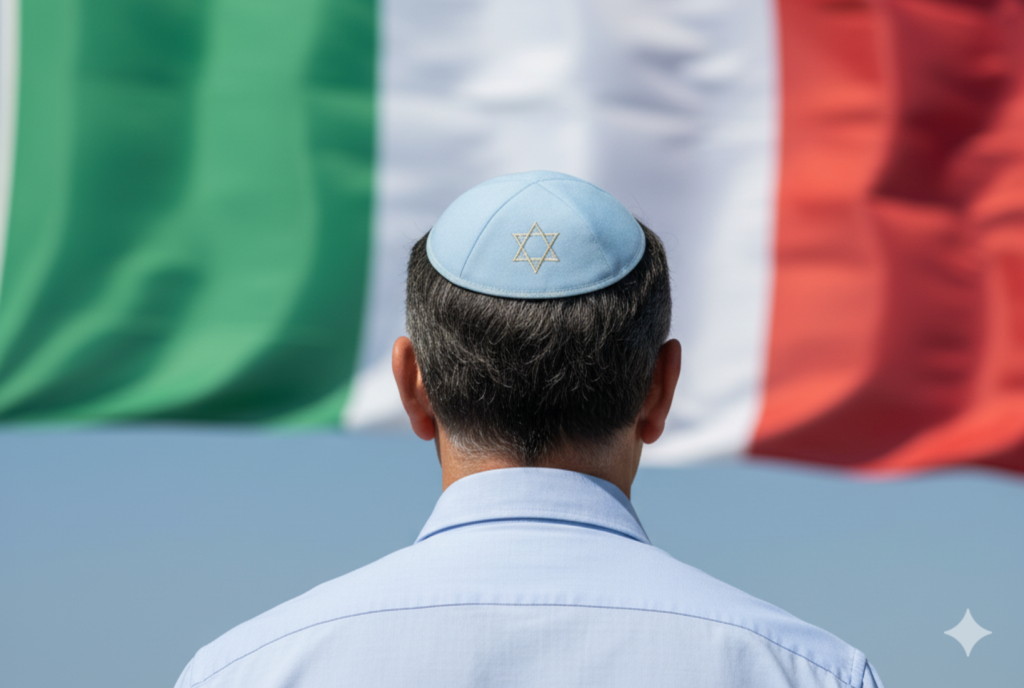Hate crimes against Jews nearly doubled in 2024, and there are few signs of abatement so far in 2025. Jews in Milan and Rome now ask questions they thought had been buried since 1945
On a university campus in Naples, Italy, students chanted “Zionists out!” to shut down a lecture by a leading Jewish editor. In Rome’s Senate, a 94-year-old Holocaust survivor who defended Israel’s right to exist was suddenly branded a traitor in her own country. And in August, New Communist Party a revived far-left organization, published a blacklist of more than 150 Italian Jews – journalists, academics, and politicians – labeling them “Zionist agents” to be “condemned and fought.” These recent incidents, almost unthinkable just a few years ago, reveal a disturbing convergence of antisemitism and outright Jew-hatred in Italy’s public sphere.
Italy has long prided itself on being relatively safe for Jews compared to other European countries. But that perception is quickly unraveling. According to the Centro di Documentazione Ebraica Contemporanea (CDEC), a Milan-based think tank that monitors antisemitism in Italy, hate crimes against Jews nearly doubled in 2024, and there are few signs of abatement so far in 2025. Jews in Milan and Rome now ask questions they thought had been buried since 1945: Is it safe to wear a kippah in the street? Should we remove mezuzot from our doors? Can we send our children to Jewish schools without fear?
The war in Gaza has certainly been a catalyst, but the antisemitism now visible in Italy runs deeper than geopolitical anger. What is most alarming is how it has zeroed in on Italy’s prominent Jewish intellectuals and public figures. In other words, the debate has shifted from political critique of Israel’s policies to personal attacks on Jews whose voices shape Italian culture and civic life.
The clearest sign came in August 2024, when Italy’s New Communist Party , a revived far-left organization, circulated a blacklist of Jewish and pro-Israel figures. The list named more than 150 people, including writers, journalists, politicians, academics, rabbis, and communal leaders. They were described as Zionist agents and accused of spreading propaganda — and the public was urged to condemn and fight them. Among those singled out were Rome’s chief rabbi, Riccardo Di Segni, the president of the Italian Jewish community, Noemi Di Segni, and well-known intellectuals and journalists such as the La Repubblica editor-in-chief Maurizio Molinari, and the Italian-Israeli writer Manuela Dviri. Echoes of the 1930s are unmistakable: an official document stigmatizes Jews and portrays them as enemies of the nation.
The inclusion of Molinari on that list was hardly symbolic. His personal trajectory illustrates how the troubling new climate has played out in practice. As editor-in-chief of La Repubblica, Molinari attempted to maintain balanced coverage of the Israel-Hamas war and refused to vilify Israel wholesale. For this, he became the target of a newsroom revolt and was ousted in 2024. When invited to speak at the University of Naples, protesters chanting “Zionists out!” blocked him from doing so. President Sergio Mattarella denounced the incident as intolerant, but the message was clear: a Jewish journalist could no longer speak freely without being branded a pariah.
Liliana Segre, a Holocaust survivor and senator for life in Italy, experienced perhaps the sharpest reversal. Once celebrated as a moral authority, she faced vilification after insisting that Israel has the right to defend itself and rejecting false Holocaust analogies. Senators who had given her standing ovations sat in silence. She was advised to stay home on Holocaust Remembrance Day. Segre explained why she would not call Gaza a genocide: “I came to know the word genocide; now it’s used for everything.” That statement alone triggered a flood of abuse.
The thread that ties together the blacklisting of intellectuals, the removal of journalists from newsrooms, intimidation on university campuses, and campaigns against symbolic figures such as Liliana Segre is clear: antisemitism cloaked in the seemingly respectable language of anti-Israel critique. No longer is the attack directed explicitly at “the Jew,” as in the 1930s, but at “the Zionist,” “the propagandist,” “the agent.” The substance, however, remains the same: the delegitimization of Jewish presence and the Jewish voice in the public sphere.

